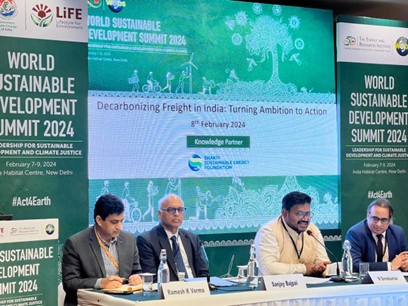
TERI Organised its ‘Annual World Sustainable Development Summit’ (WSDS) 2024 where Narayankumar Sreekumar, Associate Director, Electric Mobility, Shakti, moderated a session on ‘Decarbonising Freight in India: Turning Ambition to Action’ on February 8, 2024, in New Delhi.
The focus of that session was on initiatives to curtail GHG emissions from the freight sector in India. The session delved into India-specific technology advancements, as well as sector-specific barriers related to freight decarbonisation. Panelists for the thematic track included sectoral experts (road, rail, and waterways) from ministries and departments, nongovernmental organisations (NGOs), original equipment manufacturers (OEMs), research institutes, and other private sectors (including freight carriers).
The participants also discussed the remarkable economic growth in the last decade, India has become one of the fastest growing major economies in the world. Further, with continued growth in economic activities and urbanisation, transport demand for both passenger and freight is poised to rise. India handles 4.6 billion tonnes of goods each year, amounting to a total annual cost of INR 9.5 lakh crore, and provides livelihood to more than 22 million people. The freight movement in India majorly relies on road (70%) and rail (26%) followed by aviation (2%) and waterways (2%). Even though India’s transport sector contributes to approximately 5% of GDP, it accounts for more than 13% of CO2 emissions and more than 15% of the final energy consumption. At the current rate, freight-related emissions are expected to quadruple by 2050 from the year 2021.
